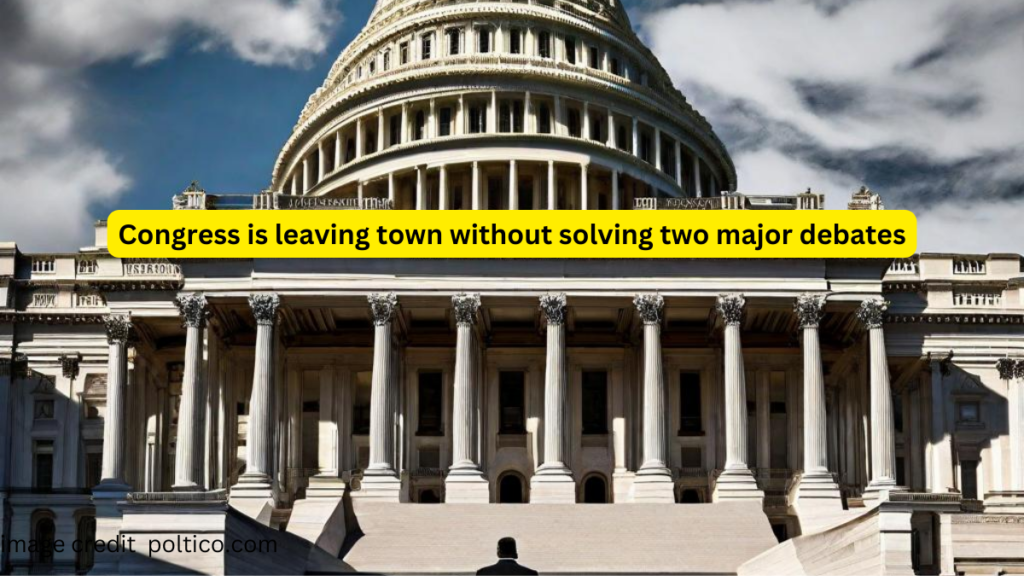Congressional Spending Deadlines, usually in a frenzy before Christmas, face an exceptional challenge this year. Rather than wrapping up key decisions, they’re deferring the most significant battles to the new year, setting the stage for a high-stakes showdown as they return to the Capitol on Jan. 8.
Table of Contents
Funding Tightropes and Fiscal Deadlines
The looming deadlines paint a tense picture: two weeks to allocate funds for critical sectors like transportation, housing, agriculture, and energy by Jan. 19. A mere three-day window follows, with both chambers in session till Feb. 2, the cutoff date to avert a government shutdown by financing all other agencies.
However, the heart of the discord lies in a disparity between the House and Senate on proposed expenditure levels, creating hurdles in drafting and passing a comprehensive budget.
A Budgetary Quagmire
The root of the tussle dates back to the debt ceiling agreement inked last spring, committing $1.59 trillion for the 2024 fiscal year, alongside an extra $69 billion for non-defense spending. Yet, shifting political landscapes have tilted the balance.
House Republicans, now led by Speaker Mike Johnson, challenge the tagged $69 billion as “gimmicks,” vying to ax this additional spend despite it being pivotal in garnering Democratic support for the debt ceiling deal.
Johnson’s stance, advocating adherence to the $1.59 trillion but rejecting the $69 billion, stands at odds with Senate counterparts who lean towards honoring the original deal brokered between Biden and the erstwhile Speaker McCarthy. This ideological dissonance, compounded by a tight timeline, amplifies the challenge of reconciling discrepancies, as set by the ‘laddered’ funding extension ratified in November.
Hurdles and Hypothetical Solutions
Johnson’s resolve against short-term extensions adds layers to the impasse. His proposition for a ‘full year’ extension until the 2024 fiscal year-end to recalibrate focus raises complexities due to a provision within the debt ceiling agreement. Failure to pass all 12 spending bills by April’s end triggers across-the-board spending cuts, skewing heavily towards non-defense sectors, originally intended to foster bipartisan negotiations.
The deadlock persists with Murray and DeLauro from the Democratic camp echoing disdain for deviating from the initial agreement, underscoring the looming specter of a government shutdown.
The Foreign Aid Conundrum and Border Security
As the House winds down for the holidays, the Senate remains embroiled in negotiations over a crucial border security package intertwined with foreign aid allocations.
Biden’s proposed aid package, encompassing substantial sums for Ukraine, Israel, and humanitarian causes, faces resistance in the form of stringent border security demands from skeptical Republican quarters. The Senate, White House representatives, and DHS Secretary Alejandro Mayorkas maneuver to align policies, vital for securing Senate approval and avert a stalling of crucial aid.
Impasses and Ideological Rifts
Republican senators demand a comprehensive bill over a mere framework, while House Republicans advocate for immigration overhauls to justify aid disbursements. The urgency heightens amidst the Ukraine-Russia tension and the Biden administration’s warnings of dwindling resources to counter Putin’s aggressive moves.
The stakes are high, with Schumer underscoring global scrutiny and the need to persevere against adversarial forces.
Conclusion: A Precarious Balancing Act
The corridors of power in Washington face a tightrope walk in the upcoming months. The tug-of-war over budgets, foreign aid, and border security exemplifies the intricate interplay of politics and policy-making, where ideologies clash, deadlines loom, and global repercussions await decisions made in the hallowed halls of Congress. The challenge ahead is daunting, requiring not just political acumen but an unwavering commitment to steer the ship through turbulent water
What are Congressional spending deadlines?
Congressional spending deadlines are crucial cutoff dates by which the U.S. Congress must allocate funds for various government programs and agencies. Failure to reach agreements before these deadlines can lead to government shutdowns or the implementation of temporary funding measures.
Why are Congressional spending deadlines important?
These deadlines determine the allocation of financial resources for critical sectors like transportation, housing, agriculture, and energy. Meeting these deadlines ensures the uninterrupted functioning of government agencies and programs, avoiding disruptions or shutdowns that can impact the economy and public services.
How does the disagreement between the House and Senate impact Congressional spending deadlines?
Differences in proposed spending levels between the House and Senate can lead to gridlock and challenges in passing a comprehensive budget. This discrepancy often necessitates negotiations and compromises to reach agreements before the deadlines.
What are the potential consequences of a government shutdown related to Congressional spending deadlines?
A government shutdown can have widespread repercussions, impacting federal services, national parks, public safety, and the economy. It can also affect confidence in government functionality, potentially influencing financial markets and public sentiment.
